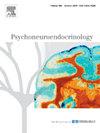睾丸激素会迅速增加男性对衣着保守的女性的非人化情绪。
IF 3.6
2区 医学
Q2 ENDOCRINOLOGY & METABOLISM
引用次数: 0
摘要
过去的研究发现,性化妇女往往被非人化(即被赋予了较低的人类品质)。然而,人们对导致这种非人化的机制仍然知之甚少。在这项预先登记的实验中,我们采用了受试者内、安慰剂对照、交叉设计的方法,测试了睾酮是否会导致男性(120 人,年龄范围:18-38 岁)对女性的非人化。在鼻内注射睾酮或安慰剂凝胶后,男性观看了一段女性穿着适度(即保守)或暴露(即性感)服装的视频(受试者间因素),然后完成了三项微妙的非人化任务,分别测量基于情绪、基于个性和基于知觉的非人化。我们假设睾酮会增加非人化程度,尤其是对于观看了 "性化服装 "视频的男性而言。相反,我们发现,无论是服用睾酮还是安慰剂,男性都会对性化女性产生基于情感的非人化,而睾酮则会增加对穿着保守的女性产生基于情感的非人化。其他形式的非人化不受睾酮的影响。我们还探讨了人格特征(如支配性)和生物特征(如 CAG 重复多态性)是否也会调节睾酮对某些社会行为的影响,但我们没有发现任何显著的调节作用。总之,本实验揭示了一种影响基于情感的非人化的新型生理机制。本文章由计算机程序翻译,如有差异,请以英文原文为准。
Testosterone rapidly increases men’s emotion-based dehumanization of a conservatively dressed woman
Past research has found that sexualized women are often dehumanized (i.e., attributed reduced human qualities). However, the mechanisms contributing to such dehumanization remain poorly understood. In this pre-registered experiment involving a within-subject, placebo-controlled, cross-over design, we tested whether testosterone contributes to men’s (N = 120, age range: 18–38 years) dehumanization of women. After administration of intranasal testosterone or placebo gel, men watched a video of a woman wearing either modest (i.e., conservative) or revealing (i.e., sexualized) clothing (between-subjects factor) and then completed three subtle dehumanization tasks, measuring emotion-based, personality-based, and perceptual dehumanization. We hypothesized that testosterone would increase dehumanization, especially for men who watched the “sexualized-clothing” video. Instead, we found that, while men engaged in emotion-based dehumanization toward the sexualized woman both when they had testosterone and placebo, testosterone increased emotion-based dehumanization toward the conservatively dressed woman. Other forms of dehumanization were not affected by testosterone. We also explored whether personality (e.g., dominance) and biological (e.g., CAG repeat polymorphism) traits that have been found to moderate the effects of testosterone on some social behaviors also moderated the effects examined here, but we did not find any significant moderations. Overall, this experiment revealed a novel physiological mechanism affecting emotion-based dehumanization.
求助全文
通过发布文献求助,成功后即可免费获取论文全文。
去求助
来源期刊

Psychoneuroendocrinology
医学-精神病学
CiteScore
7.40
自引率
8.10%
发文量
268
审稿时长
66 days
期刊介绍:
Psychoneuroendocrinology publishes papers dealing with the interrelated disciplines of psychology, neurobiology, endocrinology, immunology, neurology, and psychiatry, with an emphasis on multidisciplinary studies aiming at integrating these disciplines in terms of either basic research or clinical implications. One of the main goals is to understand how a variety of psychobiological factors interact in the expression of the stress response as it relates to the development and/or maintenance of neuropsychiatric illnesses.
 求助内容:
求助内容: 应助结果提醒方式:
应助结果提醒方式:


